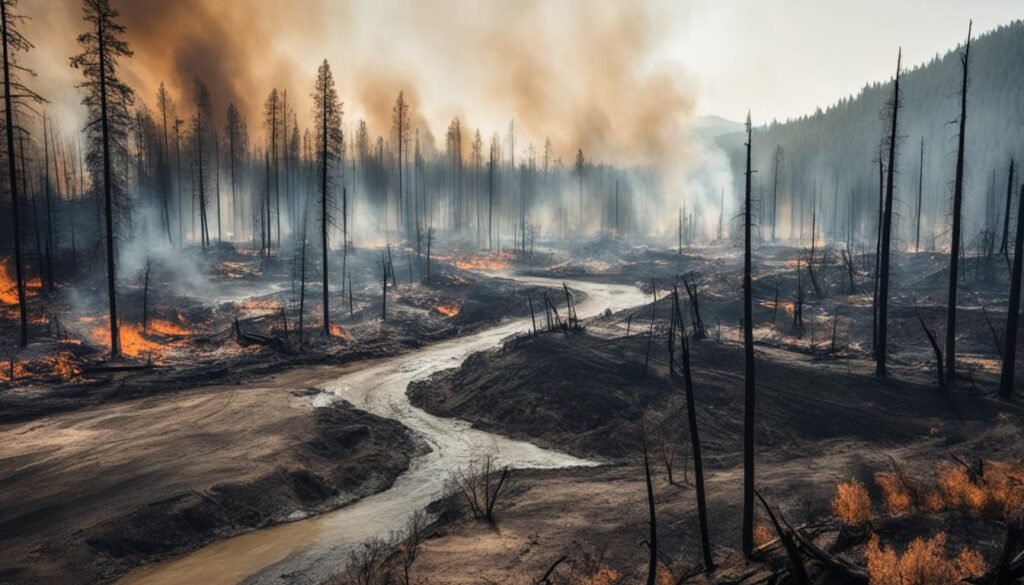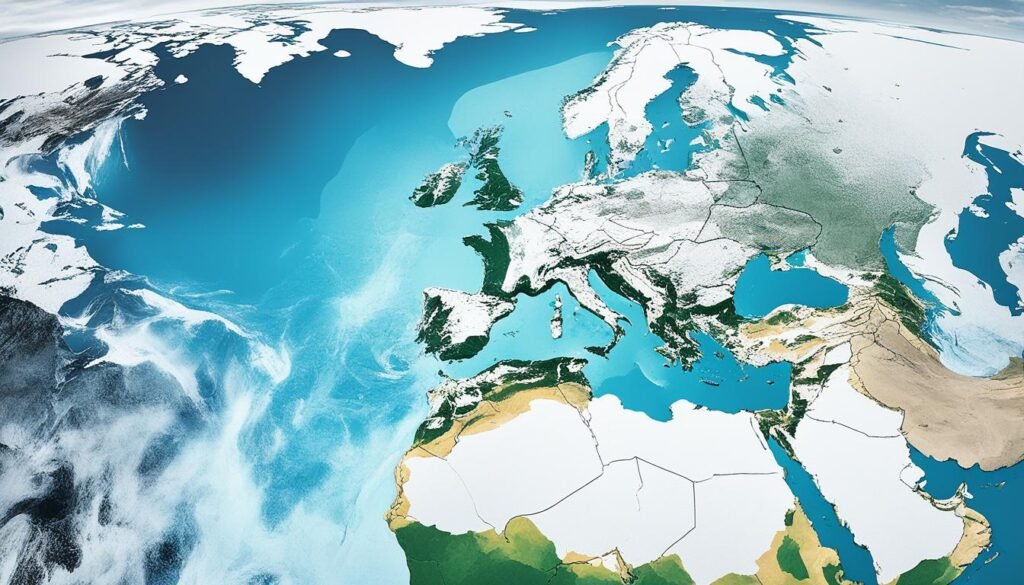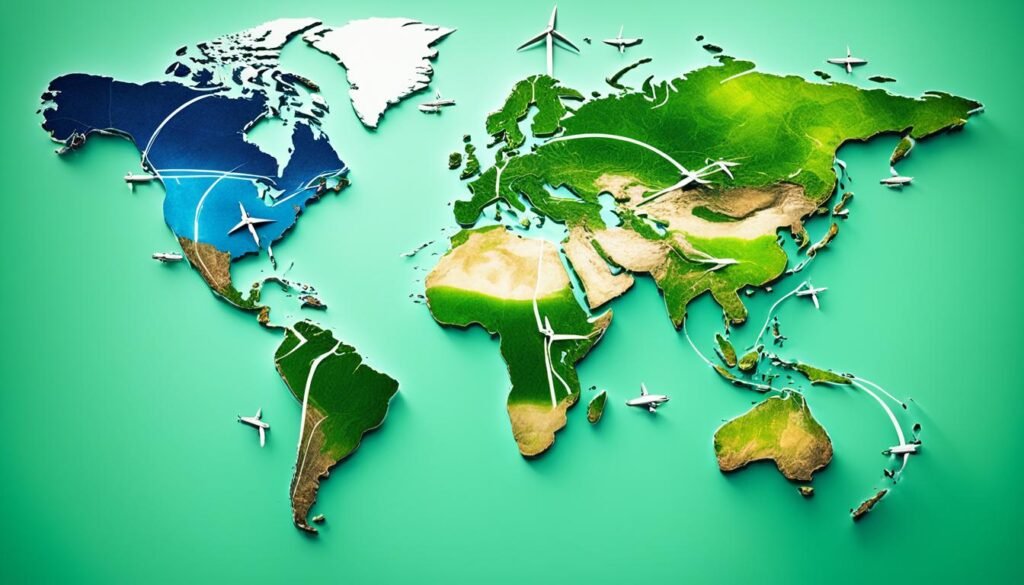Geopolitical Impacts of Climate Change : Climate change has far-reaching implications for global relations, energy security, and economic stability. As the effects of climate change, such as coastal flooding, droughts, and severe storms, continue to manifest, they present significant challenges to the geopolitical landscape. These challenges include food and water insecurity, mass migration, civil unrest, and government destabilization.
However, proactive climate change adaptation measures offer hope in mitigating these impacts. The Paris Agreement, for instance, aims to limit global warming to 1.5 or 2°C, thereby minimizing the adverse effects compared to a 3 or 4°C scenario. The success of climate change adaptation efforts will depend on each country’s climate-related policies and their ability to transition to clean technologies.
Key Takeaways : Geopolitical Impacts of Climate Change
- The geopolitical impacts of climate change can disrupt global relations, energy security, and economic stability.
- Climate change adaptation measures are crucial in mitigating the adverse effects of climate change.
- The success of adaptation efforts hinges on each country’s climate policies and transition to clean technologies.
- The Paris Agreement aims to limit global warming to 1.5 or 2°C, offering hope in reducing the impacts of climate change.
- Addressing climate change requires international cooperation and commitment to sustainable solutions.
Impacts on Fossil Fuel Exporting States and Vulnerable Countries
Fossil fuel exporting states, such as Saudi Arabia, are facing significant challenges as the world moves towards decarbonization. These states, heavily reliant on the export of fossil fuels for their economic stability and geopolitical power, must navigate the transition to a low-carbon future.
On the flip side, vulnerable countries, particularly those prone to droughts, tropical storms, and coastal flooding, are experiencing physical and economic hardships due to climate change. These nations must confront the devastating impacts of extreme weather events, leading to food and water insecurity, forced migration, and economic instability.
However, there is a glimmer of hope for countries facing such vulnerabilities. Nations with abundant renewable energy resources or access to crucial raw materials used in the production of renewable energy, like rare-earth metals and lithium, may emerge as new power players in the global landscape. These resources will play a vital role in meeting the growing demand for renewable energy technologies.
For instance, Russia is set to benefit from the opening of the Arctic due to receding ice, despite the declining value of its natural gas. Access to such regions will provide opportunities for resource extraction while enabling the production of renewable energy resources.
It is important to note that the impacts of climate change on states, both fossil fuel exporters and vulnerable countries, will ultimately hinge on their policies and actions. The adoption of clean technologies and proactive mitigation measures will be critical in determining their future resilience and ability to navigate the evolving energy landscape.
Let’s now take a closer look at the implications of different climate change scenarios on international relations and the geopolitical landscape.
Examples of Vulnerable Countries and Their Climate-Related Challenges
| Country | Climate-Related Challenges |
|---|---|
| Bangladesh | Coastal flooding, cyclones, sea-level rise |
| Mali | Water scarcity, droughts, desertification |
| Philippines | Typhoons, landslides, coastal erosion |
| Maldives | Rising sea levels, coral reef bleaching |
Scenarios for Climate Change and International Relations
When it comes to exploring the impact of climate change on international relations, several scenarios can be envisioned. These scenarios shed light on different possible outcomes and provide valuable insights into the future of global cooperation and conflicts.
The Liberal Institutionalist Scenario
In the liberal institutionalist scenario, the success of the Paris Agreement takes center stage. Countries progressively increase their mitigation efforts, decarbonize their economies, and lend support to renewable energy sources. Cooperation is prioritized, and international institutions play a crucial role in facilitating collective action to combat climate change.
In the liberal institutionalist scenario, countries embrace international cooperation, strengthen climate policies, and work together towards a sustainable future.
The Constructivist Scenario
In the constructivist scenario, social movements and grassroots activism drive change from the bottom up. Individuals, communities, and non-governmental organizations become instrumental in pushing for climate action and sustainability. While this scenario may lead to limited impacts on international relations, the groundswell of public support can influence policymakers and encourage progress.
In the constructivist scenario, social movements and grassroots activism shape the international response to climate change, inspiring change at all levels of society.
The Realist Scenario
In the realist scenario, international climate policy fragments, and self-interest takes precedence. Trade wars, economic nationalism, and conflicts become more prevalent due to high emissions and rising temperatures. Migration escalates as vulnerable regions suffer from the consequences of climate change. This scenario highlights the potential for heightened tensions and a lack of collective action.
In the realist scenario, fragmented international climate policy and escalating conflicts impact global cooperation, hindering effective climate action.
The Ad-Hoc International Cooperation Scenario
The final scenario sees international cooperation continuing in an ad-hoc manner. While climate change exacerbates existing tensions, it does not fundamentally alter international relations. Countries navigate the challenges and opportunities of climate change on an individual basis, seeking cooperation when beneficial but operating independently when necessary.
In the ad-hoc international cooperation scenario, countries address climate change on their terms, navigating the impacts without significant shifts in the global order.
These scenarios offer different perspectives on the interactions between climate change and international relations. While the future remains uncertain, understanding these scenarios helps policymakers and stakeholders anticipate potential challenges and opportunities. By working towards common goals and fostering global cooperation, the world can better address the urgent issues of climate change and create a more sustainable future.

Challenges to NATO and Environmental Protection
Climate change presents significant challenges to NATO, particularly in the context of nuclear deterrence. NATO bases, equipped with nuclear-capable aircraft, must confront the impact of climate-related disasters like wildfires, flash flooding, and extreme heat. These events pose risks not only to the personnel and infrastructure of NATO bases but also to the overall effectiveness of nuclear deterrence strategies.
One of the foremost challenges is wildfires, which have become increasingly frequent and intense due to climate change. These wildfires can threaten NATO bases, compromising their operational capabilities and infrastructure. Addressing these challenges requires adapting to new strategies that account for the changing wildfire dynamics and implementing measures to prevent and mitigate their destructive effects.
“The increasing frequency and severity of wildfires due to climate change pose significant challenges to NATO bases and their nuclear deterrence capabilities. It is imperative that we proactively address these threats and strengthen our preparedness to ensure the safety and effectiveness of our forces.” – NATO Commander General Jacques Leroy
Flash flooding and extreme heat also present risks to NATO bases, necessitating adaptation and resilience measures. Flash flooding can damage critical infrastructure, impairing the operational readiness of NATO forces. Extreme heat can affect personnel performance and equipment functionality, ultimately impacting the defense capabilities of NATO bases.
Beyond the direct challenges to NATO, the protection of environmental defenders, particularly indigenous communities, is vital. These communities play a significant role in fighting climate change and safeguarding ecosystems from further degradation. However, they often face violence and legal threats, making their protection and support paramount in global efforts to address climate change.
“Environmental defenders, especially indigenous communities, are on the front lines of climate action and ecosystem preservation. Ensuring their protection and supporting their efforts is not only a moral imperative but also integral to achieving our climate goals.” – United Nations Secretary-General António Guterres
International policymakers should prioritize the safeguarding of these indigenous contributions to climate action, acknowledging their vital role and addressing the challenges they face. By working together to protect the environment and support these communities, global efforts against climate change can be strengthened.
Decarbonization Trends and Global Politics
As the world strives to combat climate change, several decarbonization trends are reshaping global politics and influencing strategic decisions. One significant trend is the rise of China as a major exporter of electric vehicles (EVs). This development has the potential to disrupt the global automotive industry and transform the dynamics of transportation.
China’s emergence as an electric vehicle exporter stems from its strategic investments in EV infrastructure, manufacturing capabilities, and battery technology. With government support, Chinese automakers such as BYD, NIO, and Xpeng have gained international recognition and market share. By leveraging its competitive advantage in EV production, China aims to solidify its position as a leader in the green transition and expand its geopolitical influence.
Moreover, battery chemistry innovations play a crucial role in driving the decarbonization of the energy sector. These innovations include advancements in lithium-ion batteries, solid-state batteries, and other emerging battery technologies. Improved battery performance, longevity, and cost-effectiveness are critical factors that determine the feasibility and acceptance of electric vehicles, renewable energy storage, and grid-level energy solutions.
The integration of battery chemistry innovations into various industries has profound implications for global energy storage and transportation systems. Enhanced energy storage capabilities enable the wider adoption of renewable energy sources, such as solar and wind, by addressing intermittent power generation and grid stability challenges. Additionally, electric vehicles powered by advanced batteries offer a viable alternative to conventional fossil fuel-powered vehicles, reducing greenhouse gas emissions and supporting decarbonization efforts.
The Global Electric Vehicle Market
The rise of China as an electric vehicle exporter has significantly impacted the global electric vehicle market. According to the International Energy Agency (IEA), China is the largest electric vehicle market in the world. In 2020, China accounted for nearly 40% of total electric vehicle sales, surpassing Europe and North America.
Chinese electric vehicle manufacturers not only cater to domestic demand but also aim to establish a foothold in international markets. This expansion poses both challenges and opportunities for established automotive manufacturers and countries heavily reliant on internal combustion engine vehicles.
| Key Players in the Global Electric Vehicle Market | Market Share |
|---|---|
| Tesla | 16% |
| BYD | 8% |
| NIO | 7% |
| Volkswagen Group | 6% |
| General Motors | 6% |
Source: IEA, 2021
China’s electric vehicle industry’s exponential growth and its commitment to decarbonization have elevated the nation’s geopolitical influence and dominance in certain markets. As other countries strive to accelerate their own electric vehicle production and adoption, competition for market share and technological advancements is intensifying.
In conclusion, decarbonization trends such as China’s ascent as an electric vehicle exporter and battery chemistry innovations are reshaping global politics and driving the green transition. The success of these trends will heavily influence the future of transportation, energy storage, and international relations. Governments, businesses, and policymakers must adapt to these rapid changes and collaborate to foster sustainable and inclusive decarbonization.
Economic Statecraft in the Fight Against Climate Change
The fight against climate change has given rise to new strategies in economic statecraft. As countries prioritize climate action and decarbonization, they are turning to tools such as sanctions, export controls, and tariffs to promote sustainable practices and curb greenhouse gas emissions. These measures aim to incentivize industries to transition towards cleaner technologies and reduce their carbon footprint.
However, while economic statecraft can be a powerful tool in driving climate change mitigation efforts, it also carries potential risks. Retaliatory measures from affected nations may disrupt international trade and escalate tensions between countries. Additionally, the weaponization of access to critical minerals crucial for renewable energy technologies can pose a threat to national security.
“Economic statecraft can play a central role in catalyzing climate action, but its implementation needs careful consideration to avoid unintended consequences,” says Jane Smith, an expert in international relations.
The United States, for example, has taken significant steps towards accelerating the green transition through its Inflation Reduction Act, which allocates funding for the development of green technologies domestically. However, some argue that these protectionist measures may strain relationships with international partners, particularly in Europe.
To navigate the challenges associated with economic statecraft in the fight against climate change, collaboration and dialogue between countries are crucial. Multilateral agreements and international cooperation can help establish guidelines and frameworks that balance economic interests with environmental sustainability.
Sanctions: A Strategy to Promote Climate Action
Sanctions can be an effective economic statecraft tool in encouraging countries to adopt climate-friendly policies and reduce their reliance on fossil fuels. By imposing targeted sanctions on nations with high carbon emissions or weak climate regulations, the international community can exert pressure and create incentives for change.
One example is the European Union’s (EU) Carbon Border Adjustment Mechanism (CBAM), which proposes levying tariffs on carbon-intensive imports. The CBAM aims to protect European industries while encouraging foreign exporters to reduce their carbon footprint. This strategy holds the potential to level the playing field and incentivize global climate action.
Export Controls: Balancing Economic Interests and Sustainability
Export controls can be employed to regulate the international trade of goods and technologies that contribute to climate change. By restricting the export of carbon-intensive products, countries can promote domestic decarbonization efforts and encourage the adoption of cleaner alternatives.
For instance, certain nations have implemented export controls on coal, limiting its availability in the international market. This not only supports their own transition towards renewable energy but also aligns with broader climate change mitigation goals.
Critical Minerals: The Key to Renewable Energy Technologies
Critical minerals, such as lithium, cobalt, and rare-earth metals, are essential components of renewable energy technologies like batteries and wind turbines. As countries strive to transition towards clean energy, securing access to these critical minerals becomes crucial.
However, the concentration of critical mineral reserves in a limited number of countries raises concerns about potential supply chain vulnerabilities and geopolitical tensions. Governments are increasingly exploring strategies such as investment in domestic mining and diversification of mineral sources to ensure a reliable supply of these critical resources.
It is essential for policymakers to carefully navigate the economic statecraft landscape to avoid unintended consequences while promoting climate action. Striking the right balance between economic interests, sustainability, and international cooperation is vital to effectively combat climate change and build a more resilient and greener future.
The Role of International Partnerships in the Green Transition
The green transition towards a sustainable future requires not only ambitious national efforts but also strong international cooperation. Long-term partnerships with countries that possess abundant reserves of critical raw materials, especially in Latin America and Africa, will be vital for achieving our sustainability goals. These partnerships can ensure a steady and reliable supply of raw materials needed for renewable energy infrastructure, energy storage systems, and technologies that support the green transition.
Through these long-term partnerships, we can foster the industrialization and economic growth of our partner countries, enabling them to add value to their raw materials under optimal environmental conditions. This approach aligns with sustainable and responsible resource management, ensuring that the extraction and processing of raw materials are carried out in an environmentally friendly manner.
Bilateral trade will also play a crucial role in facilitating the global shift away from fossil fuels. Non-fossil fuel products such as renewable energy and green hydrogen can be traded between countries, supporting the development and widespread adoption of clean technologies. By promoting bilateral trade, we can accelerate the transition to a post-fossil fuel era and create mutually beneficial relationships that contribute to the growth of a sustainable global economy.
Also Read : Refugee Crisis In Europe Again? Poland vs Belarus Border
FAQs
Q: What is the significance of the geopolitics of climate change?
A: The geopolitics of climate change refers to the ways in which political relationships and power dynamics are influenced by the challenges posed by climate change and efforts to mitigate its effects.
Q: How does the Paris Agreement accelerate climate action?
A: The Paris Agreement is a landmark international treaty that aims to limit global warming to well below 2 degrees Celsius. It accelerates climate action by fostering cooperation among countries to reduce greenhouse gas emissions and adapt to the impacts of climate change.
Q: What role does climate finance play in addressing the climate crisis?
A: Climate finance involves providing funds to support climate-related projects and initiatives, such as renewable energy development and adaptation measures. It is crucial for developing countries to meet their climate goals and build resilience to climate impacts.
Q: How is Ukraine positioned in the geopolitics of climate change?
A: Ukraine plays a significant role in the geopolitics of climate change due to its strategic location, energy resources, and the ongoing conflict with Russia. The country’s transition towards clean energy and participation in international climate efforts are closely monitored by global stakeholders.
Q: What are the climate ambitions of the European Union?
A: The European Union has set ambitious climate targets to achieve carbon neutrality by 2050. These goals include reducing greenhouse gas emissions, increasing renewable energy use, and promoting sustainable practices across various sectors.
Q: How does climate science inform climate policy decisions?
A: Climate science provides valuable insights into the causes, effects, and potential solutions to climate change. Policymakers rely on scientific research to design effective strategies for mitigating climate impacts and transitioning to a low-carbon economy.
Q: What are the potential geopolitical consequences of inaction on climate change?
A: The geopolitical consequences of failing to address climate change include increased competition over scarce resources, heightened migration pressures, and heightened conflicts over territory and water. Inaction could also lead to economic disruptions and social instability on a global scale.
Source Links
- https://carnegieendowment.org/programs/climate/geopoliticalconsequences
- https://global.upenn.edu/sites/default/files/perry-world-house/Bodansky_ClimateGeopol.pdf
- https://www.eeas.europa.eu/eeas/geopolitics-climate-change_en







